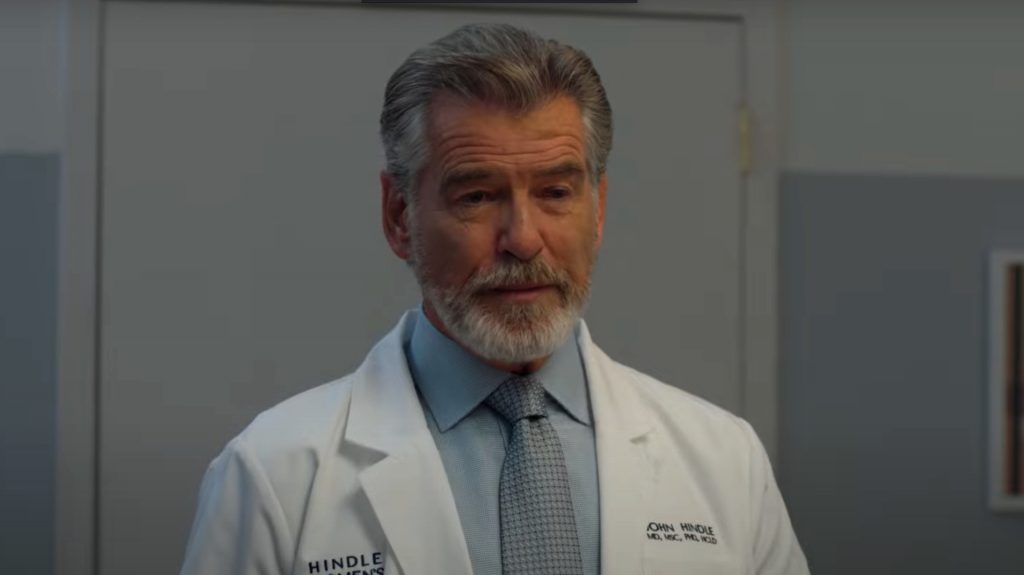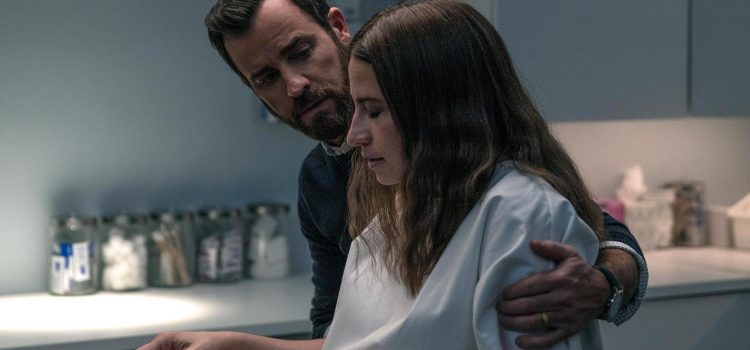By Lynn Venhaus
With comparisons to a modern-day “Rosemary’s Baby,” expectations were heightened for “False Positive,” but whatever sinister vibe this psychological thriller wanted to build up in its first two-thirds, badly falls apart with a preposterous ending.
Fantasy and fiction collide in a disturbing way as an affluent young couple go through a first pregnancy that we already know is not going to end well because of the first scene, a flash forward. How they get there isn’t convincing either, although there are strong moments and good performances.
Ilana Glazer, best known for the comedy “Broad City,” plays a rising marketing specialist working for a boutique ad agency in Manhattan. She wants a baby but after two years of trying, she and her husband Adrian (Justin Theroux), a reconstructive surgeon, haven’t been able to conceive. His mentor in med school, Dr. John Hindle, is a fertility doctor who can work miracles, he tells his wife.
They will have a happy ending, they’re told. As the pompous doctor with a raging God complex, Pierce Brosnan deliciously chews the scenery. He clearly enjoys embracing the arrogance the role demands – and there’s something unsettling about how cheerful his assistants are, especially Nurse Dawn (Gretchen Mol). Shades of “The Stepford Wives”!
As if getting pregnant weren’t complicated enough, Lucy sets out to uncover the unsettling truth about her smarmy doctor and she starts to suspect her husband may be complicit
The script by Glazer and her “Broad City” writing partner John Lee, who also directed, is best as pointing out the anxiety and fears expectant mothers have, as well as how motherhood is viewed in the workplace.
While it’s believable that the hormonal Lucy would have concerns and we see that her intuition isn’t too far off – we only get her point of view. We don’t know much about Adrian and Theroux has little to work with or convey.
When Lucy begins having weird dreams –some presented as fantasies, which are mixed in with a nightmarish reality, it’s hard to keep straight what is just her imagination and what might have really happened.
Because we already have unanswered questions, that jagged tone doesn’t help in establishing her as a sympathetic character. She is trying to convince others she is not crazy when she does, in fact, seem delusional.
When it’s revealed that she is pregnant with twin boys and a single girl fetus, selective reduction is recommended – although she goes against the doctor’s suggestion to keep the boys, because she desperately wants a girl, to be named Wendy, a nod to her cherished late mother, who read her “Peter Pan.”

From the bizarre birth scene to the film’s ludicrous conclusion, we are expected to accept all these outlandish outcomes and absurd actions. It becomes so far removed from logic, why should we believe any of it?
The once-promising film devolves into a pathetic, icky, brutal bloodbath that can best be described as nonsense.
It’s run time is only 92 minutes, and the ending feels too abrupt, so they could have taken some more time in making it credible.
This is the kind of film that I wanted to really like, especially its points about modern moms. It had me, and then it lost me.
“False Positive” is a psychological thriller-horror film directed by John Lee and starring Ilana Glazer, Justin Theroux, Pierce Brosnan, Gretchen Mol and Josh Hamilton. It is rated R for disturbing/bloody images, sexual content, graphic nudity and language and has a run-time of 1 hour, 32 minutes. It begins streaming on Hulu starting June 25. Lynn’s Grade: C

Lynn (Zipfel) Venhaus has had a continuous byline in St. Louis metro region publications since 1978. She writes features and news for Belleville News-Democrat and contributes to St. Louis magazine and other publications.
She is a Rotten Tomatoes-approved film critic, currently reviews films for Webster-Kirkwood Times and KTRS Radio, covers entertainment for PopLifeSTL.com and co-hosts podcast PopLifeSTL.com…Presents.
She is a member of Critics Choice Association, where she serves on the women’s and marketing committees; Alliance of Women Film Journalists; and on the board of the St. Louis Film Critics Association. She is a founding and board member of the St. Louis Theater Circle.
She is retired from teaching journalism/media as an adjunct college instructor.

